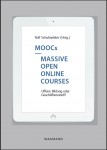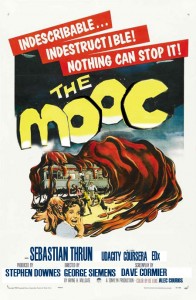1 hour 20 minutes about the impact and future of MOOCS:
Tag Archives: MOOC
MOOCs - Massive Open Online Courses - Offene Bildung oder Geschäftsmodell
Das erste (?) deutschsprachige Buch zum Thema MOOCs ist im Waxmann Verlag erschienen. Und hier kann es kostenlos herunter geladen werden.
Herausgeber ist Rolf Schulmeister, Autoren der Beiträge sind
- Rolf Schulmeister
- Christoph Meinel
- Jörn Loviscach & Sebastian Wernicke
- Jürgen Handke & Peter Franke
- Sascha Spoun, Holm Keller & Jutta Grünberg-Bochard
- Eric Rabkin
- Simone Haug & Joachim Wedekind
- Burkhard Lehmann
Viel Vergnügen beim Lesen.

Blaming the MOOC || Der MOOC ist Schuld
Diskussion bitte || Discussion please
English version below, sorry, qtranslate wouldn’t work properly with this WP version
MOOCs sind schlecht, MOOCs funktionieren nicht, MOOCs widersprechen allem was Lernen ausmacht und MOOCs bedrohen die universitäre Lehre. Das sind die Aussagen, welche dieser Tage, ok, seit einigen Wochen, vermehrt im Netz auftauchen. Gleichzeitig ist die Euphorie ungebrochen, immer mehr Länder, bzw. deren Universitäten schließen sich dem Trend (?) an, selbst in Deutschland1. Bezüglich all der Schlechtigkeit, welche den MOCCs zugeschrieben wird: Wie wäre es denn, einfach mal den Blickwinkel zu verändern und MOOCs aus einer anderen Perspektive zu betrachten? Was bieten MOOCs? Einige Fakten zum Nachdenken:
- MOOCs sind frei im Sinne von
- Zugangsbedingungen
- Kosten
- MOOCs sind ein freiwilliges Angebot von verschiedenen Bildungseinrichtungen, in erster Linie Universitäten
- Die Organisation von MOOCs kostet die Veranstalter Zeit und Geld
- MOOCS bieten jedem/r Interessierte/n die Möglichkeit, an thematisch und zeitlich begrenzten Bildungsangeboten auf Hochschulniveau teilzunehmen
- Die Teilnahme ist nicht an bestimmte Orte gebunden, ein Internetzugang reicht aus
- Selbstgesteuertes Lernen ist meist möglich, nur wenige Termine begrenzen die Freiheit der Selbstorganisation.
Habe ich etwas vergessen? Sicherlich, es spielt aber keine Rolle. Worauf es ankommt: MOOCs sind ein noch sehr sehr junges Lernangebot, erste Erfahrungen sind kaum mehr als ein Jahr alt. Langfristige Erfahrungen existieren noch nicht. Und was meiner Meinung nach noch viel wichtiger ist:
Die Teilnahme an MOOCs ist komplett freiwillig!
Ich entscheide mich für oder gegen eine Teilnahme. Was ich dann nicht verstehen kann, ist die Tatsache, dass die allgemeine und teilweise auch spezifische, auf bestimmte MOOCs bezogene Kritik so unverschämt daher kommt. Die Veranstalter sind uns Lernenden gegenüber nicht in einer Bringschuld! Möchte man teilnehmen, dann muss man sich zumindest in Teilen auch den Umständen anpassen. Stellt man fest das etwas nicht passt oder schief läuft, dann kann man konstruktiv kritisieren, Verbesserungsvorschläge machen. Im schlechtesten Fall bricht man die Teilnahme ab und sollte das dann unter “gemachte Erfahrungen” verbuchen.

Credit: Eugene of Norway, Licence cc, Links at the bottom
MOOCs are bad, MOOCs doesn’t work, MOOCs contradict all what makes good learning possible and MOOCs threatens the academia. These are some of the statements, we could read within the last days, ok, weeks. At the same time the euphoria continues unabated, more and more countries, and their universities are joining the trend (?) Even in Germany2. Regarding all the bad or wicked which is attributed to the MOCCs: How would it be just to change the personal perspective and looking at MOOCs from a different perspective? What is the offering MOOCs made to the learner? Some facts to consider:
- MOOCs are free in the sense of
- Access conditions
- Costs
- MOOCs are a voluntary offer from various educational institutions, primarily universities
- The organization of the MOOCs costs time and money
- MOOCS offers any interested person the opportunity to participate in education at university level, often without timelimits. Also participation is possible at any place of the world, at any time
- Participation is not limited to certain places, just an Internet connection is sufficient
- Self-directed learning is possible, only a few dates limit the freedom of self-organization.
Did I miss something? Certainly, it does not change the game. What matters: MOOCs are still very fresh on the learning market. Long-term experiences do not exist. And what is even more important in my opinion:
Participation in MOOCs is completely voluntary!
I decide whether or not to participate. What I do not understand then is the fact, that the general and sometimes specific criticism related to certain MOOCs sounds so outrageously. The organizers of MOOCs are not committed to offer us the possibility of participation. If you want to participate, you have adapt to the circumstances. If you determine that something goes wrong, then you can criticize constructively, suggest improvements. In the worst case everyone is free to end the participation andthe experiences should be recorded under “experiences made”.
You are very welcome to disprove me. In addition I am really interested to hear or read from your MOOC experiences
Quellen || Sources (just an excerpt)
Rosanna Tamburri - All about MOOCs - University Affairs
Moshe Y. Vardi - Will MOOCs destroy Academia? - Communications of the ACM, Vol. 55 No. 11, Page 5
Joe Bruner - Will online learning destroy America’s colleges? - O’Reilly Radar, November 20, 2012
John V. Lombardi - MOOCs and the Future of the University - Inside Higher Ed, November 12, 2012
Daniel Clark - Pitfalls of an automated education, or limitations of the MOOCs - LearningShrew, November 11, 2012
Laura Pappano - The Year of the MOOC - The New York Times, November 2, 2012
Tamar Levin - Students Rush to Web Classes, but Profits May Be Much Later - The New York Times, January 6, 2013
Neil deMause - Free Online Classes: Unlocking the Ivory Tower - The Village Voice, January 2, 2013
Gordon Katic - A look back, and the year ahead, in post-secondary education - Canadian University Press, January 4, 2013
Adi Gaskell - MOOCs are Coming to Britain - Technorati, December 15, 2012
Bildrechte || Photo Credit
Vecchia Betty; Licence: cc, direct URL: http://www.flickr.com/photos/vecchiabetty/2992081813/
Eugene Van Grinsven (Eugen of Norway); Licence: cc, direct URL: http://www.flickr.com/photos/eugenre/3731989037/
- Selbst in good old Germany wacht man langsam auf. Sehr langsam und man versucht alles neu zu erfinden, selbst Dinge, die sich schon beweisen konnten oder aber als untauglich eingestuft wurden. Aber das ist ein anderes Thema. [↩]
- Good old Germany, you wake up slowly. Very slowly … and trying to invent anything new, even things who proved as working well or things already assessed as a fail. But that’s a completely another topic. [↩]

